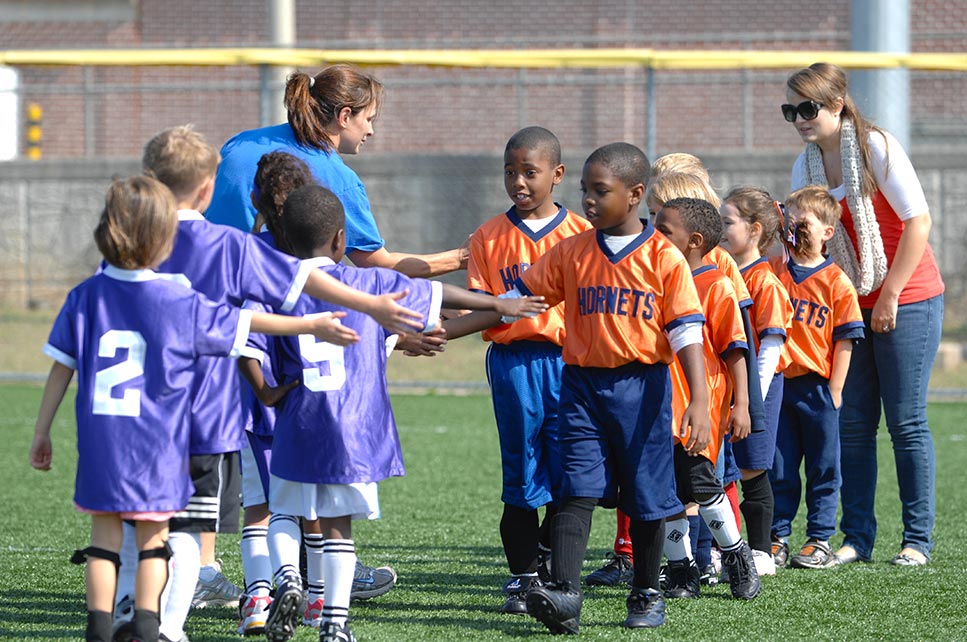Little league coaches and parents are notorious blowhards. The vast majority of young people who eagerly join youth sports leagues in kindergarten will quit before middle school. Some discover their talents are not in athletics, but many kids are so beaten-down and discouraged by the elitist competition and the relentless barrage of criticism, they give up on sports all together.
It’s a dirty, crying shame. Not all young people are athletically inclined, but they do all deserve a chance to establish healthy habits and a good exercise routine. Young children look forward to and enjoy regular opportunities to play with friends. Most importantly, well-designed youth football, baseball, soccer, and lacrosse leagues offers kids regular opportunities to learn priceless life lessons in settings that can be both challenging and affirming.
Lesson 1: When you fall down, get up quickly.
Most young children have a flair for the dramatic. Long before he puts on his first uniform, every child begins to think of his parents and most other adults as members of his fan club. When he is hungry or tired, cold or uncomfortable . . . especially when he might be injured . . . he performs. When a three year old trips or tumbles, he quickly scans his horizon for an audience. When he makes eye-contact with an adult, he starts screaming.
One of the first lessons kids learn in youth league sports is that tantrums are a dangerous waste of time. The game goes on. Kids who hunker down in the middle of the field to examine a scratched knee get ignored, kicked, and run over, usually by accident. It is an essential lesson, one that will have applications for the rest of the child’s life. Falling down is not a big deal. In most cases, falling is an ordinary part of sports. Kids should learn to skip the drama, get up quickly, and re-engage in the game.
Falling down is an ordinary part of life. It is always surprising, but it’s as common and predictable as change. Falling usually does not hurt as much as we expect. Life marches on. Kids who learn to get up quickly become resilient, learning to persevere despite discomfort and occasional embarrassment.
Lesson 2: The referee is in charge of the game.
Parents often mistake their child’s negotiating skills for a sign of intelligence. Continual negotiation is actually a sign of bad parenting. Parents who vacillate train their children to negotiate. Young children negotiate because they think of adults as equals. Today’s children grow up believing they are heads of household, responsible for decisions that affect the entire home and family.
Participating in youth league sports teaches children that they are not in charge of everything. In most cases, in most sports, negotiation is not tolerated. The referee makes the calls. Even when the referee errs, he still controls the game. A good referee mostly ignores hecklers and argumentative kids. Kids who persist in self-centered complaint get punished, a firm reprimand or a yellow card.
Playing by the rules is an essential element of citizenship. It is good to learn there are fixed boundaries, rules we agree are important to the safety and enjoyment of the people. The referee controls the game because, at least in theory, he is fair and impartial, not available for negotiation. As is true in other areas of life, youth sports are much more successful and fun when all the players demonstrate respect for the referee, the field of play, and the rules that were firmly established long before they joined the game.
Lesson 3: Winning Isn’t Everything
Adults often have more to learn from children about winning than they can teach. In competitive arenas, we seem to regress as we age. Parents and coaches can be hopelessly immature, unable to stand on the sidelines or sit in the stands without becoming irrationally obsessed with winning. Surveys conducted by The National Alliance for Youth Sports indicates that every year about 80% of parents witness or participate in a violent or inappropriate display of parental aggression on the sidelines.
Bribery is a standard mode of encouragement. Parents promise young children pizza, toys, high top tennis shoes, and cold cash for scoring goals. Children who have enjoyed an hour of team sports often return home with a fist-full of Oreos or an ear full of parental disapproval, coaching errors or the referee’s bad calls.
Even when the score is grossly imbalanced, kindergarteners usually have no idea which team won. It takes all their physical and emotional energy to run in the right direction. Watching a moving ball is a significant challenge to their short attention spans. Young children love to play with their friends, they enjoy learning something new, but they really do not care if they win. They wonder when they get to play with their friends again. That is exactly as it should be.
Winning really isn’t everything. A good season, like a good career, is one that begins and ends with positive role models, individual improvement, and lasting contributions to the team effort. The coaching has been good if the members of the team want to continue playing. The leadership has been great if the weakest players have improved. In youth sports and in life, the stars are those who understand that every game is an opportunity to exercise and learn. The winners are the people who work hard, do their best, encourage their peers, and – win or lose – walk off the field smiling.



Leave a Comment